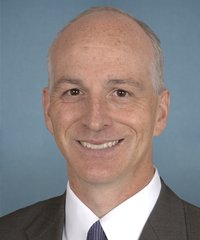
Adam Smith was born on June 15, 1965, in Washington, D.C. Adam was raised in SeaTac, Washington where his father, Ben, worked as a ramp serviceman at SeaTac Airport and was active in the local Machinists’ Union. His mother, Leila, stayed at home, raising Adam and his two brothers. Adam attended Bow Lake Elementary, Chinook Middle School, and Tyee High School, graduating from Tyee in 1983.
After a year at Western Washington University, Adam transferred to Fordham University, where he worked his way through college loading trucks for United Parcel Service and graduated in 1987 with a degree in Political Science. Following his graduation, Adam attended the University Of Washington School Of Law, and earned his law degree in 1990. He later worked in both private and public practice, first as a lawyer at Cromwell, Mendoza and Belur in 1992, and then as a prosecutor for the City of Seattle from 1993-1995. As a prosecutor, Adam focused on drunk driving and domestic violence cases, and in 1996, went on to work as a judge pro tempore.
I firmly believe that America is home to the most talented and best educated workforce in the world. Throughout my career, I have consistently promoted policies that encourage companies to provide high quality jobs with good wages and benefits, fought to safeguard the right to organize, and supported investments in workforce training and education programs to ensure all individuals have access to high quality job training.
Promoting High Quality Jobs
Safeguarding the Right to Organize
The ability to organize and collectively bargain for benefits was one of the most important advances in American labor law and has been a major contributor to our historically robust middle class. As the son of a union baggage handler at SeaTac Airport, I understand how important labor unions are in the lives of American workers and their families. I am a strong supporter of the Protecting the Right to Organize Act (PRO Act), which strengthens the federal laws protecting workers’ rights to join a union, overrides states ability to pass “right to work” laws which undermine labor unions, and cracks down on employer interference with union elections. I also support legislation to keep workers safe on the job by codifying certain industry-recognized safety standards when companies attempt to put profits over people.
Expanding Education and Workforce Training
For too many people, the barriers to receiving an education or obtaining the skills needed to succeed are insurmountable. I have long advocated for greater funding for community and technical colleges and supported increased investments in paid workforce training opportunities like Registered Apprenticeship programs and work-based learning programs. These programs create pathways to high-quality in-demand jobs for individuals. I have also been in a leader in Congress, advocating for investments in wrap-around support services and stipends for individuals in workforce training programs and two-year education programs to ensure they have the assistance they need to cover everyday living costs such as housing, food, and transportation. I have introduced the Pre-Apprenticeship Wrap-around Support Services Fund Act, the Emergency Economic and Workforce System Resiliency Act, and the Empowering Individuals to Succeed Through Education and Workforce Training Act.
Enhancing Corporate Accountability and Worker Power
For too long, corporations have put shareholder profits and executive pay over average worker wages, benefits, and job quality. I support legislation such as the Accountable Capitalism Act and the Reward Work Act, which would require large corporations to have employee representation on corporate boards and would crack down on stock buybacks and other corporate actions that threaten the long-term viability of the company for the sake of increasing short-term shareholder value. I also support efforts to expand the employee-ownership, worker cooperative, and employee stock ownership plan models. Evidence has shown that employee-owned firms increase wages and benefits for workers, preserve jobs and local ownership, and improve company performance.